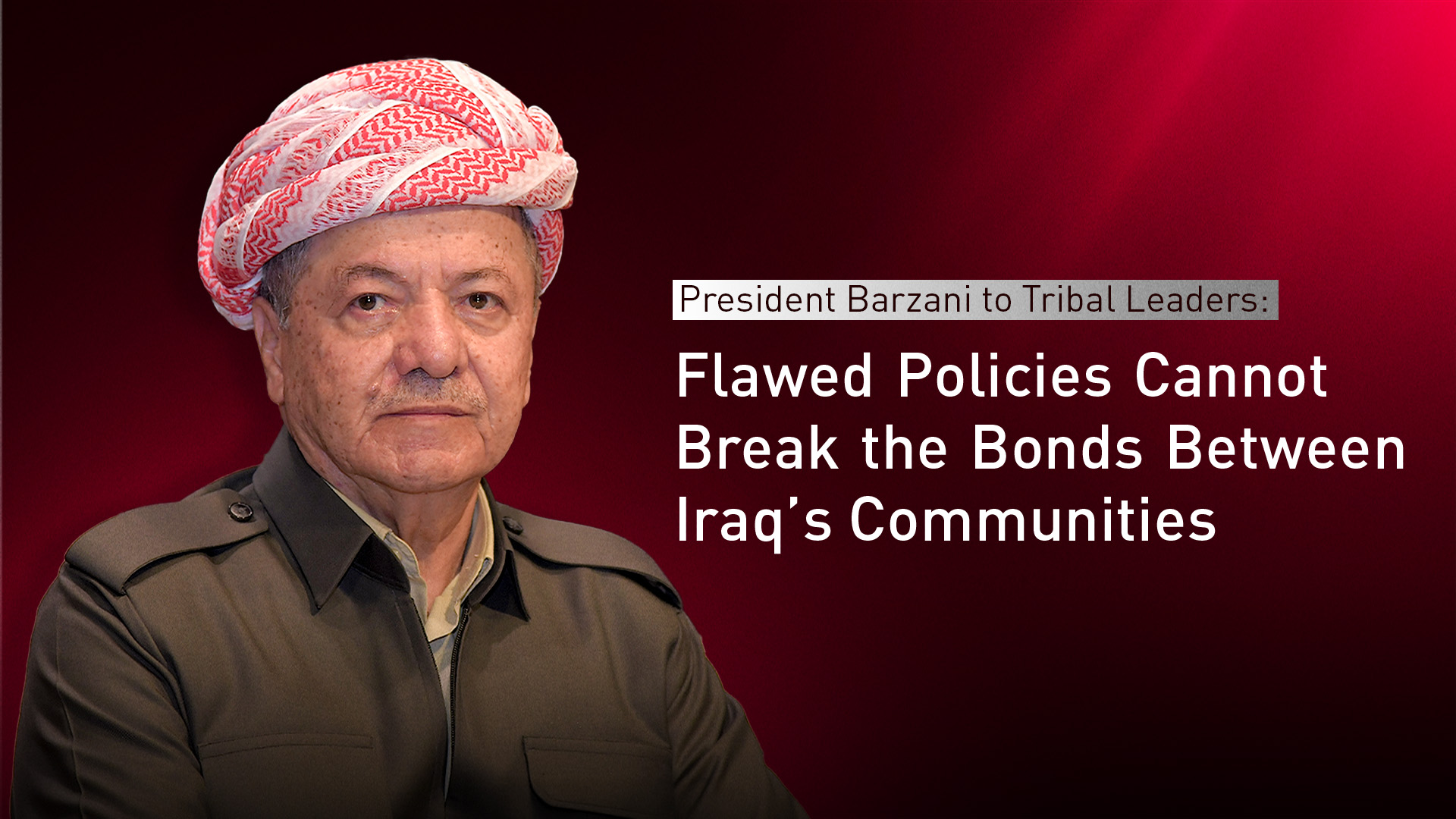President Barzani to Tribal Leaders: 'Flawed Policies Cannot Break the Bonds Between Iraq’s Communities'
The visiting delegation expressed their appreciation for Barzani’s stance in promoting national unity, coexistence, and brotherhood, particularly during Iraq’s most difficult times marked by terrorism and displacement.

ERBIL (Kurdistan24) — President Masoud Barzani on Sunday welcomed a delegation of tribal sheikhs, leaders, and prominent figures from Iraq’s southern and central provinces, in a show of intercommunal solidarity and support for Kurdistan’s stability and role in post-conflict Iraq.
The meeting, held at Barzani’s residence in Pirmam, marks a continuation of efforts to strengthen ties between the Kurdistan Region and Iraq’s diverse ethnic and tribal communities. The visiting delegation expressed their appreciation for Barzani’s stance in promoting national unity, coexistence, and brotherhood, particularly during Iraq’s most difficult times marked by terrorism and displacement.
The guests also extended gratitude to the people of Kurdistan for hosting large numbers of internally displaced persons (IDPs) from other parts of Iraq during the war against ISIS. They lauded the Kurdistan Region’s development and resilience, noting that despite numerous challenges, the Region has managed to maintain peace and deliver progress. The delegation affirmed their support for the legitimate rights of the Kurdish people and conveyed messages of solidarity and goodwill to the people of Kurdistan.
Barzani warmly welcomed the visitors and, in a speech, reflected on the historical injustices suffered by the Kurdish people under successive Iraqi regimes. He emphasized that disagreements between the Kurdistan Region and the Iraqi government should not be mistaken for hostility between the peoples. "The flawed policies of governments can never sever the ties between Iraq’s communities," he stated.
Barzani reiterated his vision for a prosperous Iraq in which dignity and rights are preserved for all citizens across every region. He stressed that true governance in Iraq can only succeed through full implementation of the constitution and adherence to three key principles: balance, partnership, and consensus.
He also warned against the politicization of livelihood, saying, “The sustenance of citizens must never be used as a political weapon, nor can it become a tool against the people of Kurdistan.” The Kurdish leader doubled down on the importance of mutual respect and coexistence within a federal framework, calling for the fair treatment of all Iraqi communities and for building bridges based on common values and shared history.
The meeting comes against the backdrop of persistent and deepening tensions between the Kurdistan Regional Government (KRG) and the federal government in Baghdad, driven by Baghdad’s repeated violations of the Iraqi Constitution—particularly in withholding the Kurdistan Region’s rightful share of the federal budget and undermining its oil and financial entitlements. For years, successive governments in Baghdad have adopted discriminatory policies that have not only crippled the KRG’s ability to provide basic services but have also weaponized economic pressure to subdue the Kurdish people’s aspirations for autonomy and dignity.
These challenges are compounded by the aftermath of the ISIS war, during which the Kurdistan Region bore the heaviest humanitarian burden, sheltering millions of displaced Iraqis while Baghdad offered little support. Despite these injustices, the Kurdistan Region has remained a bastion of stability, coexistence, and resilience in a fragmented and politically fragile Iraq. During the peak of the war against ISIS (2014–2017), the Kurdistan Region served as a safe haven for nearly 2 million displaced Iraqis, earning it domestic and international praise.
The Sunday meeting with tribal leaders not only highlights Kurdistan’s humanitarian role but also serves as a reminder of the region’s strategic position in fostering national reconciliation.
Barzani, a key figure in Iraq’s political transition since 2003, has repeatedly called for peaceful dialogue to resolve constitutional disputes and has urged Baghdad to respect the autonomy granted to Kurdistan under Iraq’s 2005 constitution.
This renewed outreach between Kurdish leadership and Arab tribal communities signals growing interest in strengthening intra-Iraqi unity through grassroots alliances—particularly at a time when Iraq continues to face political gridlock, economic strain, and regional tensions.
